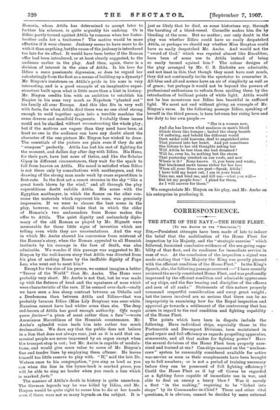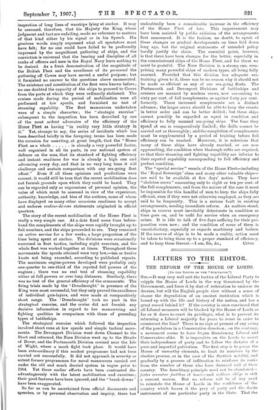CORRESPONDENCE.
THE STATE OF THE NAVY.—THE HOME FLEET.
r To THE EDITOR Or THE " SPECTATOR...] - SIR,—Persistent attempts have been made of late to induce the belief that the mobilisation of the Home Fleet for inspection by his Majesty, and the "strategic exercise" which followed, furnished conclusive evidence of the sea-going capa- bility of that fleet, and its readiness for immediate service in case of war. At the conclusion. of the inspection a signal was made stating that "his Majesty the King was greatly pleased with the efficient condition of the Home Fleet." lathe King's Speech, also, the following passage occurred :—" I have recently reviewed the newly constituted Home Fleet, and was profoundly impressed by the efficient condition and admirable appearance of my ships, and the fine bearing and discipline of the officers and men of all ranks." Statements of this nature properly command respectful consideration and carry great weight ; but the issues involved are so serious that there can be no impropriety in examining how far the Royal inspection. and approval go towards a settlement of the controversy that has arisen in regard to the real condition and fighting capability of the Home Fleet.
The points which have been in dispute include the following. Have individual ships, especially those in the Portsmouth and Devonport Divisions, been maintained in good repair and full efficiency as regards propelling apparatus, armaments, and all that makes for fighting power? Have the several divisions of the Home Fleet been properly exer- cised and trained at sea? Can ships manned on the "nucleus- crew" system be reasonably considered available for active war-service as soon as their complements have been brought up to full numbers; or is not a period of training necessary' before they can be possessed of full fighting efficiency ? Could the Home Fleet as it lay off Cowes be regarded as a fighting force capable of immediate use in war, mid able to deal an enemy a heavy blow P Was it merely a fleet "in the making," requiring to be "licked into shape" by its Commander-in-Chief ? These and other vital questions, it is obvious, cannot be decided by mere external
inspection of long lines of warships lying at anchor. It may be assumed, therefore, that his Majesty the King, whose judgment and tact are unfailing, made no reference to matters of that kind either by his signal or in his Speech. His gracious words simply expressed what all spectators must have felt; for no one could have failed to be profoundly impressed by the magnificent gathering of ships, and the conviction is universal that the bearing and discipline of all ranks of officers and men in the Royal Navy leave nothing to be desired. As a fresh demonstration of the magnitude of the British Fleet and the excellence of its personnel the gathering off Cowes may have served a useful purpose ; but it furnished no answer to the questions above enumerated. The existence and constitution of the fleet were known before ; no one doubted the capacity of the ships to proceed to Cowes from the ports at which they were ordinarily stationed. The cruises made during the period of mobilisation were all performed at low speeds, and furnished no . test of steaming capability. The fleet manceuvres undertaken were of a simple character ; the "strategic exercise" subsequent to the inspection has been described by one of the most ardent advocates of the efficiency of the Home Fleet as having "in reality very little strategy in it." Yet, strange to say, the series of incidents which has been described briefly in the foregoing terms has been made the cccasion for asserting, at great length, that the "Home Fleet as a whole is already a very powerful. factor, well organised in all its parts, in our national system of defence on the seas, that its standard of fighting efficiency and instant readiness for war is already a high one and advancing every day, and that in no very long time it will challenge and sustain comparison with any sea-going fleet afloat." Even- if all these opinions and predictions were correct, it would still be true that the recent mobilisation does not furnish grounds upon which they could be based. They can be regarded only as expressions of personal opinion, the value of which must be assessed in view of the experience, authority, knowledge, and bias of the authors, some of whom have displayed on many other occasions readiness to accept and endorse couleur-de-rose statements originated in official quarters.
The story of the recent mobilisation of the Home Fleet is really a very simple one. At.a date fixed some time before- hand the complements of the ships were rapidly brought up to full numbers, and the ships proceeded to sea. They remained on active service for a few weeks, a large proportion of the time being spent at anchor. The divisions were occasionally exercised in fleet tactics, including night exercises, and the whole fleet was worked together at times. Throughout these movements the speeds attained were very low,—ten or twelve knots not being exceeded, according to published reports. The maximum engine-powers developed were probably only one-quarter to one-third of the reputed full powers of the engines ; there was no real test of steaming capability either at full powers or over long distances. Similarly, there was no test of the general efficiency of the armaments. The firing trials made by the ' Dreadnought ' in presence of the King were most successful, but they only proved the excellence of individual gun-layers, and were made at comparatively short range. The 'Dreadnought' took no part in the strategical exercise, and the cruise did not furnish any decisive information in regard to her ruanceuvring and fighting qualities in comparison . with those of preceding types of battleships.
The strategical exercise which followed the inspection involved short runs at low speeds and simple tactical move- ments. The Devonport Division went down Channel to the Start and returned, the Nore Division went up to the Straits of Dover, and the Portsmouth Division cruised near the Isle of Wight, where a mock fight took place. It would have been extraordinary if this modest programme had not been carried out successfully. It did not approach in severity or extent former programmes for naval manceuvres carried out under the old and much decried system in vogue prior to 1904. Yet these earlier efforts have been contrasted dis- advantageously with the latest mobilisation and exercises ; their good features have been ignored, and the " break-downs " have been exaggerated.
So far as can be ascertained from official documents and speeches, or by personal observation and inquiry, there has
undoubtedly been a considerable increase in the efficiency of the Home Fleet of late. This improvement may have been assisted by public criticism of the arrangements first announced. It is the fashion, no doubt, to speak of these changes as gradual developments on lines laid down long ago, but the original statements of intended policy hardly justify the claim. The essential point, however, is that there have been changes for the better, especially in the commissioned ships of the Home Fleet, and for these we must be grateful. The Nore Division is a strong one, com- prising many powerful ships of modern types, all being fully manned. Provided that this division has adequate sea- training given to it, there can be no reason why it should not be made as efficient as any of our sea-going fleets. The Portsmouth and Devonport Divisions of battleships and cruisers are manned by nucleus crews, now amounting to sixty per cent. of full complements, as against forty per cent. formerly. These. increased complements are a distinct advance ; the larger crews should be able to keep the vessels in better order and can be better drilled ; but these ships cannot possibly be regarded as equal in condition and efficiency to fully manned sea-going ships. The time they spend at sea is comparatively ilnil led; the drills cannot be carried out as thoroughly; and the completion of complements must be supplemented by a period of training before full efficiency can be reached. Moreover, it is notorious that many of these ships have already reached, or are now approaching, the condition when thorough refits are required, so that their steaming and fighting capability are inferior to their reputed capability corresponding to full efficiency and perfect condition.
The "special service" vessels of the Home Fleet—including the 'Royal Sovereign' class and many other valuable ships-- are said to be available at five days' notice. They have "skeleton crews" amounting only to eight or ten per cent. of the full complements, and from the nature of the case it must be impossible for this handful of men to keep the ships fully efficient, even if they were not otherwise employed, as they are said to be frequently. This is a serious fault in existing arrangements, needing immediate reform. As matters stand, ships in reserve must inevitably deteriorate in condition as time goes on, and be unfit for service when an emergency arises, it is idle to talk of five days sufficing for their pre- paration even now; and the condition of some of them is unsatisfactory, especially as regards machinery and boilers. If the reserve of ships is to be made a reality, action must be taken to bring them up to a proper standard of efficiency, and to keep them thereat. —I am, Sir, &c.,







































 Previous page
Previous page